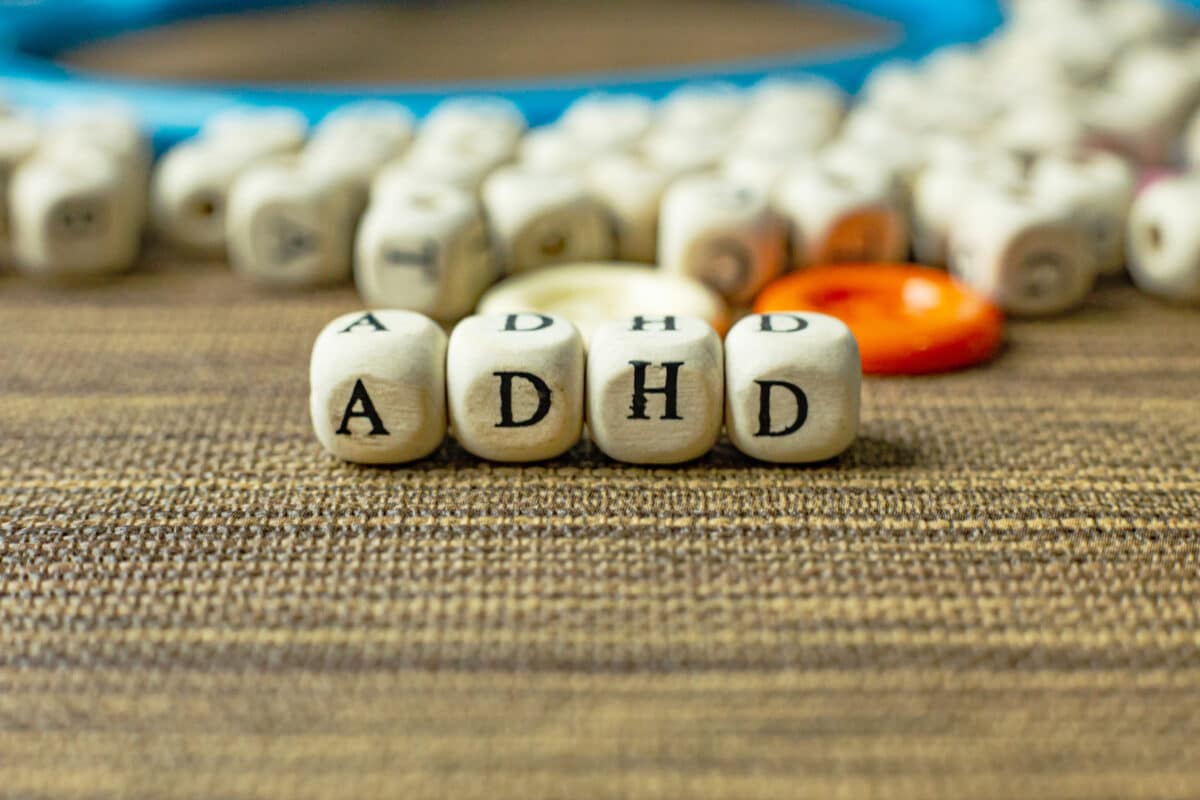One spouse has to remind the other to pick up clothes, clean up messes, and takes primary responsibility for finances, appointments, and other obligations. While the other spouse feels like they can’t do anything right, and everything just keeps falling through the cracks. Do you or does your spouse struggle with an attention disorder in your marriage? Is your spouse’s constant tendency to become distracted a source of contention in your relationship? Or maybe you are the one who is feeling misunderstood because of your inattentiveness? If so, you may be dealing with ADHD in your relationship, whether diagnosed or not diagnosed. ADHD in marriage can really take a toll on relationships. In fact, although estimates may vary, many studies “suggest that the divorce rate among couples touched by ADHD is as much as twice that of the general population.” However, even though it can create conflict and strain in marriage, it does not have to lead to divorce. Hope is definitely not lost! And, of course, we are here to help you with some tips and ideas to help you navigate ADHD in your marriage.
What is ADHD?
ADHD is often a misunderstood disorder. As a result, people are often misdiagnosed or underdiagnosed. So, what is ADHD? According to the CDC, it is a neurodevelopmental disorder “usually first diagnosed in childhood and often lasts into adulthood.” Often people have trouble controlling certain behaviors and issues with attentiveness. It can also present differently in people according to one of the three types of ADHD they may have.
Three Types
Inattentive Presentation: This person may find it difficult to follow directions or pay attention to details. They are easily distracted and disorganized. It may be hard for them to finish a task they started.Hyperactive-Impulsive Presentation: The person may fidget, and it may be difficult to sit still. They also may feel restless and impulsive. Other symptoms include talking a lot, interrupting others, and speaking at inappropriate times.Combined Presentation: This person has a combination of the above two ADHD types.
ADHD Symptoms in Women and Men
Because men and women are uniquely different, it only makes sense that each would present ADHD symptoms in differing ways. So, what are the symptoms of ADHD in men and women? How are they the same or different? Women: Even though men are more likely to be diagnosed with ADHD than women at a rate of 12.9% vs. 5.6%, it doesn’t mean fewer women have ADHD than men. Instead, women are underdiagnosed because their symptoms “are often viewed as character traits rather than symptoms of a condition.” For example, a woman may be suffering from difficulty focusing, indecision, and disorganization. However, her symptoms are written off as spacey, ditzy, and forgetful. Women are also more likely to manifest inattentive presentation symptoms, which makes diagnosis more difficult. Symptoms in women include:
Difficulty focusingDisorganizationProblems listeningIndecisionForgetfulnessPaper ClutterOverspendingRestlessness Excessive Talking
Men: Because men most often exhibit hyperactive-impulsive presentation symptoms, it is easier for doctors to recognize and diagnose. One source points out that “since inattention is more subtle than hyperactivity, it’s why boys are nearly three times more likely to be diagnosed with ADHD than girls.” Men are also more likely to have work problems associated with their ADHD. For example, they may have difficulties completing tasks on time or getting along with coworkers. Symptoms in men include:
FidgetingBeing disruptiveAlways on the goTalkativeRestlessImpulsiveImpatientProne to mood swings
How to Get Diagnosed with ADHD
Now that you might recognize symptoms in yourself or in your spouse, you may be wondering how to get diagnosed with ADHD? Is there an ADHD test? Can you self-diagnose, or should you see a doctor or therapist? Many self-diagnostic tests exist on the internet; however, experts advise people to use these as a preliminary evaluation. You should still talk to your healthcare provider to receive an official diagnosis. If you are interested in taking an online ADHD test, you can find one at ADHDAdulthood and ADDitude. Unfortunately, there is not one single test you can take that will tell you whether you have ADHD or not. However, according to CHADD (Children and Adults with Attention-Deficit/Hyperactivity Disorder), the best test is a diagnostic evaluation gathered from many sources such as “ADHD symptom checklists, standardized behavior rating scales, a detailed history of past and current functioning, and information obtained from family members or significant others who know the person well.” CHADD also advises that an evaluation should be “conducted by a licensed mental health professional or a physician.” So, is ADHD a mental illness? According to John Mersch, MD, yes, ADHD is a mental illness. However, it is important to note that with treatment, people with ADHD can still be successful and lead full productive lives. We also have some great resources to help you and your spouse navigate mental illness in marriage.
What Does ADHD Look Like in Marriage?
Often, a marriage impacted by ADHD is fraught with anger and contention. The non-ADHD spouse may be angry, overburdened, lonely, and unhappy, while the ADHD spouse may feel overwhelmed, unloved, or inferior. None of those feelings make for a happy marriage! So how can you know if you are in a marriage struggling with ADHD? Melissa Orlov, an expert on ADHD in marriage, points out the following patterns found in a relationship impacted by ADHD:
Constant naggingUneven work distributionParent/Child Relationship where one spouse plays the role of being responsible, while the other is consistently irresponsibleRecurring, senseless argumentsFailure to follow-throughBroken down sexual relationship
Do you recognize any of these patterns in your own marriage relationship? Are you the spouse struggling with ADHD or are you the non-ADHD spouse? Either way, we have ideas for coping with this issue in your marriage.
ADHD Spouse
When you are the spouse struggling with ADHD, you may feel like you can’t do anything right. It feels like your spouse is constantly on your case, and you are walking on eggshells, afraid to fail again. You might feel like your spouse treats you like a child and you are unloved because you can never live up to your spouse’s expectations. Sound familiar? How can you deal with your disorder to move forward with healing your marriage and relationship with your spouse? The first step is to get officially diagnosed by a medical expert. They can also help you to explore different treatment options for your ADHD. In the meantime, we have some ideas to help. Experts believe that changing the way you communicate can greatly help your relationship. Here are some communication tips to try:
“Use ‘I feel’ statements Communicate face-to-face Repeat and rephrase Ask questionsText yourself important takeaways from the conversationShare your struggles to help your partner understand how ADHD impacts your behaviorHold eye contact when listeningFor long conversations, consider a fidget toy like a squeeze ball to keep your mind engaged”
Non-ADHD Spouse
When you are the non-ADHD spouse in a marriage relationship, you may feel lonely and as though your spouse is “too distracted to pay any attention.” You may feel angry and stressed out because you are shouldering most of the responsibilities in your marriage. Does this describe how you feel? Fortunately, there are tools at your disposal to aid in this struggle in your marriage. While you can’t take away your spouse’s ADHD, you can change the way you approach the situation. Instead of nagging or reacting in anger, try these different tactics:
Exercise teamwork. Communicate with one another honestly and helpfully. Play to your strengths. For example, if one spouse struggles with remembering to pay the bills on time, have the other spouse take over that task. Meet and go over weekly tasks. Each week, discuss what is on the schedule and what needs to be done. Change up the workload or tasks if needed. Stick to routines. Routines can really help your ADHD spouse stay on task and stay aware of what needs to be done throughout the day and week.
Hope For Couples Navigating ADHD
While the struggle you may be going through is real, it certainly is not the end of hope for happiness in your marriage. While learning to communicate better is key, it is also important to seek joy in your relationship. And, of course, we have a ton of ideas to help you with that! The journey through life is definitely full of twists, turns, potholes, and uphills, but finding joy in the journey will make the ride totally worth it. Sources:
ADHD and relationships: How to make it work – psycom.net. (n.d.). https://www.psycom.net/adhd-and-relationships/Centers for Disease Control and Prevention. (2021, September 23). What is ADHD? Centers for Disease Control and Prevention. https://www.cdc.gov/ncbddd/adhd/facts.htmlDiagnosis of ADHD in adults. CHADD. (2018, May 24). https://chadd.org/for-adults/diagnosis-of-adhd-in-adults/Editors, A. D. D. (2021, July 28). How ADHD impacts sex and marriage. ADDitude. https://www.additudemag.com/adhd-marriage-statistics-personal-stories/Editors, A. D. D. (2022, April 25). ADHD test: Do I have add? symptoms in adults. ADDitude. https://www.additudemag.com/adhd-symptoms-test-adults/John Mersch, M. D. (2018, March 5). Is ADHD classified as a mental illness? eMedicineHealth. https://www.emedicinehealth.com/ask_is_adhd_classified_as_a_mental_illness/article_em.htmLow, K. (2020, September 20). Is your marriage impacted by ADHD? Verywell Mind. https://www.verywellmind.com/adhd-and-its-effect-in-marriage-20380Low, K. (2021, October 22). Why many women with ADHD remain undiagnosed. Verywell Mind. https://www.verywellmind.com/add-symptoms-in-women-20394Schumacher, C. (2022, January 8). ADHD symptoms in women vs men: Are there significant differences? Vista Pines Health. https://vistapineshealth.com/treatment/adhd/women-vs-men/Stanborough, R. J. (2021, November 18). ADHD and women: Why are diagnosis rates different? we explain. Healthline. https://www.healthline.com/health/adhd/adhd-in-women#symptoms-and-typesTakeda. (n.d.). Assess your ADHD symptoms. ADHD in Adulthood. https://www.adhdadulthood.com/adhd-test






